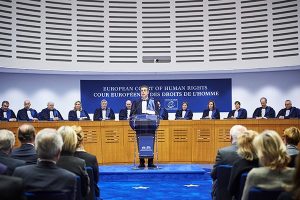I. Ziemele speaks about the impact of modern technologies on privacy at the official opening of the judicial year of the European Court of Human Rights
From 29 January to 3 February, President of the Constitutional Court Ineta Ziemele attended the annual solemn event for the opening of the judicial year of the European Court of Human Rights (hereafter also – ECtHR) in Strasbourg, France. The judicial year was opened by an international seminar, in which the participants from all Member States of the Council of Europe examined the development of the European Convention for the Protection of Human Rights through the Court’s judicature from several vantage points, including the perspective of scientific and technological development. The seminar was followed by a solemn hearing.
The solemn hearing was opened by President of the European Court of Human Rights Linos-Alexandre Sicilianos. The following report was given by the guest of honour of the hearing – Chief Justice of the Supreme Court of Ireland Frank Clarke.

President of the European Court of Human Rights Linos-Alexandre Sicilianos opens the solemn hearing. Photo: European Court of Human Rights
This year marks the 70th anniversary of the Convention. The opening seminar of the judicial year was dedicated to this anniversary. It was emphasised in the seminar that the Convention was a living instrument, which should be interpreted by the Court in accordance with the contemporary circumstances, taking into account the sociological, scientific and technological progress, as well as changing standards in the field of human rights. The main topics of the seminar were gender equality, environment, scientific and technological development.

President of the Constitutional Court of the Republic of Latvia Ineta Ziemele. Photo: Screenshot from the ECtHR seminar.
At the seminar, Ineta Ziemele shared reflections on the impact of modern technologies on privacy. She admitted that, predominantly, society was benefitting from the technological achievements of the 21st century; however, this progress was causing increasingly more challenges and dispersed borders between concepts of a democratic society.
The fact that technologies offer to individuals, companies and institutions of public administration the possibility to collect and analyse personal data causes high risks of manipulations. Analytical systems collect information about our personal choices, habits, interests, and wishes. This causes direct impact on the right to private, private space, freedom of choice and free will, which are important elements of human dignity. Ineta Ziemele underscored that in the world of algorithms, where personal data are used, questions emerge regarding the changed scope of the right to privacy. Hence, it could be assumed that we are witnessing nuanced changes in the concept of human dignity.
Ineta Ziemele drew attention to the fact that the age of science and technologies had increased the burden of responsibility for both national and international courts. She emphasised that, on the basis of the Latvian Constitutional Court’s practice, also in the legal systems of continental Europe, the courts would have larger responsibility for “weighing” values in relationships depending on the World Wide Web. This, in turn, could raise the question of how ECtHR would look at the work done by the national courts.
On Monday, 3 February, Ineta Ziemele met Judges of ECtHR within the framework of a tradition, which she herself had established, – Judges’ seminar, and spoke about judicial dialogue.
The solemn hearing for the opening of ECtHR judicial year in English is available here.
The video recording of the international seminar in English, in which presentation was given also by Ineta Ziemele (1:50:14), is available here.
The publication in English, which summarizes reflections given by Judges at the international seminar, including Ineta Ziemele’s presentation, is available here.
The agenda of the international seminar is available here.
About ECtHR
ECtHR is a regional institution for the protection of human rights, founded in 1950. The Court examines complaints regarding alleged violations of the Convention and its Protocols as well as provides advisory opinions on the interpretation of the Convention or its Protocols. The Court is comprised by 47 Judges, one per each Member State of the Council of Europe.
On 24 June 2015, Mārtiņš Mits was elected to the position of ECtHR’s Judge by the Parliamentary Assembly of the Council of Europe; he is the third Latvian Judge at ECtHR. The first Latvian Judge at ECtHR, from 1995 to 2004, was Egils Levits, currently – the President of the Republic of Latvia. From 2005 to 2014, the current President of the Constitutional Court of the Republic of Latvia Ineta Ziemele was the Latvian Judge at ECtHR.



